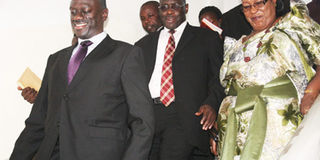Besigye on the trying moments of his trial

STEP ONE: Dr Besigye (L) leaves the Constitutional Court early this week . PHOTO YUSUF MUZIRANSA
Kampala
Many Ugandans know him as a forceful politician. Some have even dismissed his firebrand demeanor as that of a power hungry individual intending only to dislodge President Museveni for his selfish interests.
What most Ugandans, however, do not know about opposition Forum for Democratic Change -FDC - president, Dr Kiiza Besigye is that beneath the fiery persona is a quiet, humane and contemplative individual, whose tears have rolled down his cheeks many a time when his basic human instincts have gotten the better of him.
In an exclusive interview with Sunday Monitor, the grouchy-voiced politician for the first time speaks emotionally about his most painful moments during his trial on treason and a rape case that he says “fragrantly aggressed” his moral and ethical standing.
Although describing the recent dismissal of his treason case by the Constitutional Court as a courageous move by the judges, Dr Besigye says the rape trial was very painful from different perspectives.
Painful experience
“First of all, it was painful because my moral and ethical standing was being fragrantly aggressed when it was very clear that there was not even a slight basis for doing so and that is a source of pain to know that you are being treated in that way deliberately. It was quite painful,” he says. It was also painful to see a former National Resistance Army war veteran, Malita Namayanja, whom he said had “a parental kind of relationship” testify against him in the rape case against him in 2006.
Dr Besigye said he looked after Ms Namayanja during and after the bush war but said the state forced her to give “irrelevant evidence” against him. “It was very painful to see an old lady called Malita, whom I had a parental kind of relationship with, who I had looked after for a very long time, whom I was responsible for her survival during the war and after to see her abused and coming to give evidence against me,” he said, “But her evidence was totally irrelevant and did not help the case… It was quite painful,”
In 2006, Dr. Besigye was accused of raping one Joanita Kyakuwa. His trial coming as the dust of political campaigns for presidential elections was just rising captivated the nation with lurid descriptions of what exactly happened at Dr Besigye’s Luzira home in Kampala and at Bombo Military Barracks in 1997.
At one point Kyakuwa said Dr. Besigye carried her to a guest room, pinning her down on a bed pulled off her shorts and tore her pants. He then pulled down his track suit trousers and raped her. “I felt betrayal,” Kyakuwa, told court at the time. Kyakuwa said after the alleged rape, she was in pain, her private parts hurt and she had bruises.
Planning to sue
The High court dismissed the rape case against Mr Besigye in 2006 in the famous ruling by Justice John Bosco Katusi where he said the state had failed to adduce compelling evidence that Dr Besigye had raped Ms Kyakuwa. In our interview, however, Dr. Besigye now says he is planning to sue the government for “malicious prosecution” in the said rape case.
Dr. Besigye also talked about his late brother, Musaazi Kifefe whom he said died out of “illegal actions” of the state. Mr Kifefe, Dr. Besigye and nine others were charged with treason in 2006. But Dr Besigye petitioned the court to dismiss the charges in 2007, on the grounds that conducting simultaneous trials in both the military and civilian high courts was unconstitutional. The five-judge panel agreed. The Ugandan Government had accused Besigye of organising a rebel group called the People’s Redemption Army while living in South Africa. Dr. Besigye re-echoed his earlier allegations that state security agencies concocted the story of PRA rebels to tarnish his political career.



